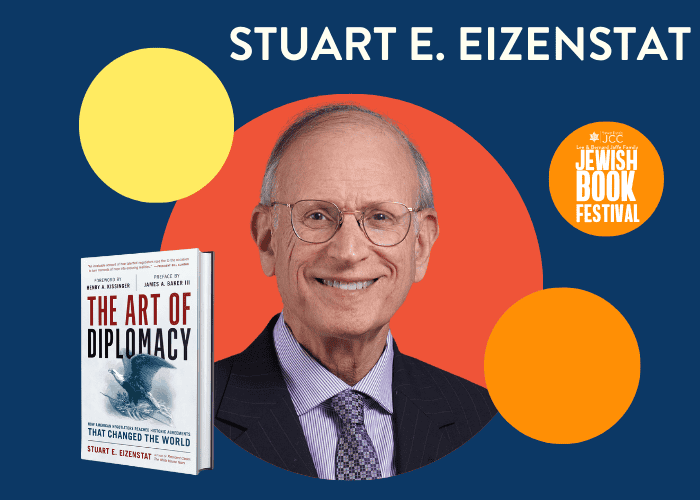Ambassador Stuart E. Eizenstat will be joined by Virginia Beach City Councilman Joash Schulman for a conversation* Monday, November 18, 7:30 pm, Sandler Family Campus
In my 56 years, I have been fortunate to meet many people who were a part of history. Sometimes I determined that meeting people who made and are a part of history is profoundly inspiring. Their stories, shaped by resilience and vision, offer invaluable lessons to all who are willing to listen. One such individual was Ambassador Stuart Eizenstat.
Ambassador Eizenstat’s latest book, The Art of Diplomacy, takes a deep look at the history and complexity of international negotiation and those who live it every day. Reading it brought me back to my meetings with him, and again, I was reminded of his impact. Engaging with the Ambassador both with several of my students and later interviewing him for an international-related podcast, fostered a deeper appreciation for his contributions and motivated me to pursue meaningful change, reminding us that history is crafted by those who dare to act.
Born in 1943, Eizenstat’s education at the University of North Carolina at Chapel Hill and the University of Chicago Law School laid the foundation for a multifaceted career that spans law, government, and international diplomacy.
Among Eizenstat’s many notable accomplishments, he served as Under Secretary of Commerce for International Trade, where he advocated for American businesses and promoted international trade agreements. He helped bolster the U.S. economy in the 1990s, a period characterized by globalization and increased competition in international markets. Eizenstat’s expertise in trade policy advanced U.S. interests abroad and reinforced the significance of multilateral trade relations.
Eizenstat also impacted how the United States viewed the peace process in the Middle East. In 1997, during remarks at the Doha Economic Conference, he presented a bold new outlook, highlighting the correlation between lasting peace in the region and the liberalization of trade and commerce. Given the current unrest on college campuses concerning economic investment, these words seem almost prophetic. Eizenstat’s insight went beyond the mere notion that the peace process historically limps along from crisis to crisis and sea-change is unattainable. Eizenstat understood that a new dynamic must involve an economic track as well as a diplomatic track. His time in Jordan, Egypt, the West Bank, and Gaza showed him that without peace, there can be no prosperity, but just as importantly, without prosperity and economic opportunity, there can be no peace.
His influence extended beyond economic policy into the realm of human rights and international justice. As the Deputy Secretary of the Treasury, he was instrumental in the creation of the U.S. Holocaust Memorial Museum, which stands as a testament to his commitment to preserving the memory of the Holocaust and educating future generations about the dangers of intolerance and discrimination.
To me, his most daring act was to advocate and spearhead negotiations related to Holocaust-era assets during a time when not many people wanted to take that on. He led efforts to resolve claims against Swiss banks for their role in holding the assets of Holocaust victims. His leadership helped facilitate agreements that provided reparations and restitution to survivors and their families, showcasing his dedication to justice and accountability.
This latest book showcases his substantial contributions to academia and public discourse. His writings, including books and countless articles, reflect his deep engagement with issues of public policy, international relations, and human rights. Through these works, he has influenced both scholarly debate and public understanding of complex issues, advocating for principles that align with democracy and human dignity.
Eizenstat continues to serve as a valued advisor with the State Department. His quiet and continued commitment to diplomacy, humanity, and public service reflects a broader understanding of the interconnectedness of global life and the importance of fostering collaboration among all people.
John Sutton has served in various academic administrative and faculty positions with Virginia Beach City Public Schools for more than 17 years. In 2011, he formed the Foreign Policy Work Group, which brings experts and policymakers in foreign affairs together with high school students to develop a deeper understanding of foreign policy.
*The presentation is part of the Lee & Bernard Jaffe Family Jewish Book Festival in partnership with the Jewish CommunityRelations Council of the United Jewish Federation of Tidewater, Simon Family JCC, and Community Partners’ 14th annual Israel Today series. Learn more and register at JewishVA.org/BookFest.

